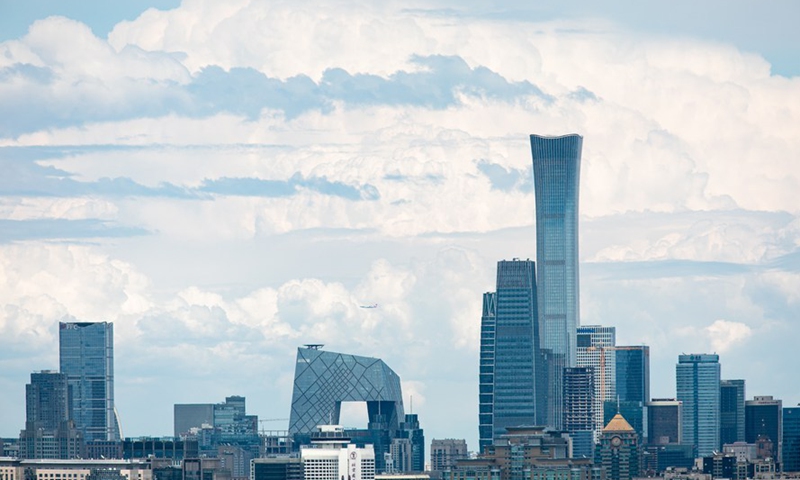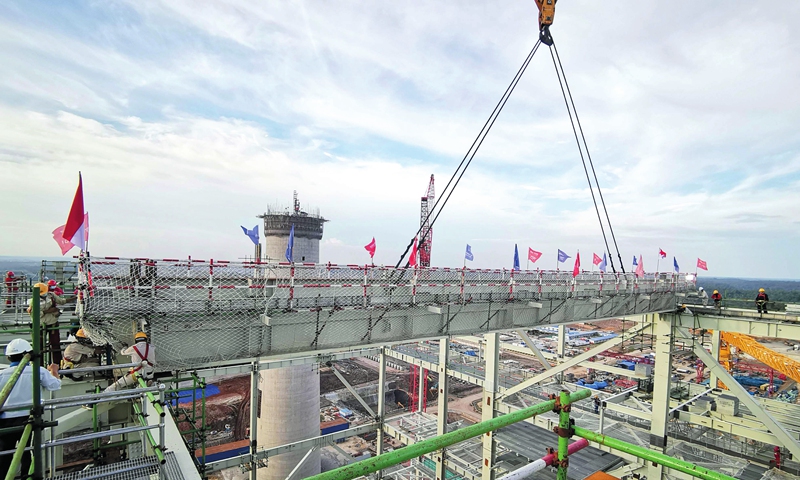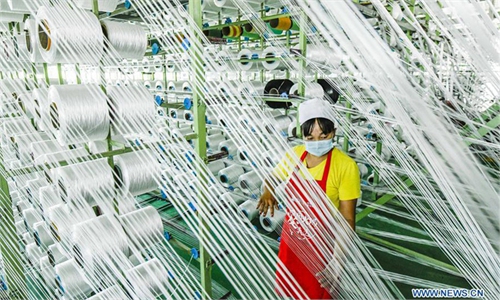SOURCE / INDUSTRIES
China turns inward amid external risks
Major shift not meant to isolate, but to continuously rise: experts

Photo taken on May 23, 2020 shows the scenery of the urban district after rainfall in Beijing, capital of China. (Photo: Xinhua)
China has sent its clearest signal yet that it will throw more policy weight and coordination to further prop up its economy with a massive consumer market and robust industrial prowess to cope with fast evolving external risks, as top policymakers start to draft a key document that would set the tone for economic and social development for at least the next five years.
While emphasis on the "domestic economy" at a top meeting on Thursday suggests a major shift in focus from export-oriented policies in the past several decades, it is not meant to isolate itself, experts noted.
Instead, the experts stressed, the shift is a result of comprehensive calculations of both the massive domestic potential and the deteriorating external environment for the Chinese economy. The move will not only help further lift the Chinese economy, but also benefit a world economy in dire need of new growth impetus, they added.
Major policy shift
A meeting of the Political Bureau of the Communist Party of China (CPC) Central Committee, the top decision-making body, reaffirmed that China will form a new development pattern centered on "internal circulation," which should also be better supplemented by the "external circulation," according to a statement released after the meeting.
The meeting attended by top leaders concluded that while China remains in "a period of strategic opportunity for development," it also faces a "protracted war" with "long- and medium-term" challenges and risks, the Xinhua News Agency reported. The meeting also decided that the fifth plenary session of the 19th CPC Central Committee, where proposals for the 14th Five-Year Plan (2021-25) for social and economic development will be assessed, will be held in Beijing in October.
While Chinese officials have been repeatedly stressing the importance of boosting the domestic economy to cope with external challenges and risks in recent years amid slowing global growth and rising trade tensions, especially since the COVID-19 pandemic, the emphasis at the meeting on Thursday represents a formal adoption of the policy shift that will shape China's economic policies for at least the next five years, analysts said.
"The policy shift also marks a milestone in China's economic development that we are moving away from the export-oriented economy toward a high-quality, domestically-driven economy that will be more resilient to risks and challenges," Dong Dengxin, director of the Finance and Securities Institute at the Wuhan University of Science and Technology, told the Global Times on Friday.
That shift in economic growth is ongoing, with growth becoming less reliant on exports. In 2019, internal demand accounted for 89 percent of China's GDP growth of 6.1 percent year-on-year. This year, as the COVID-19 pandemic has brought global trade to a near standstill, China's exports shrank by 6.6 percent in the first half of the year, and the prospects for a quick rebound remains dim as the deadly virus continues to ravage major economies across the world.
Against this backdrop, the emphasis on the "internal circulation" is aimed at fully realizing the "considerable" domestic potential to cope with those challenges and risks, Cheng Shi, chief economist at ICBC International Holdings in Hong Kong, wrote in a note sent to the Global Times on Friday.
"The development and expansion of 'internal circulation' will help offset external impact under the global turmoil, and, in turn, make the Chinese economy more flexible in the 'internal circulation,'" Cheng wrote, noting that focus on "internal circulation" should be targeting industrial and consumption upgrade.

The Bukit Asam Coal Power Plant of Indonesia is under construction. The China-Indonesia joint project is a part of the two countries' cooperation on the Belt and Road Initiative. File photo: cnsphoto
Not self-isolation
However, despite the emphasis on the domestic economy, China will continue to engage overseas markets, particularly emerging markets in Asia and other parts of the world, through the Belt and Road Initiative (BRI) and other global initiatives, analysts said.
Following the meeting on Thursday, the Voice of America, a perceived propaganda arm of the US government, questioned in a report on Friday whether China was self-isolating or has no other choice in making the shift.
"This is definitely not self-isolation nor a retreat because of global risks," Song Guoyou, deputy director of the Center for American Studies at Fudan University, told the Global Times on Friday. "In fact, this is about the long-term growth paths of the Chinese economy, rather than some short-term challenges and risks."
Though Chinese exports have taken a lesser role in China's economic output in recent years, China remains the world's largest trading nation, with total trade in goods reaching 31.54 trillion yuan ($4.51 trillion) in 2019, according to official data. Trade with countries along the BRI and the Southeast Asian countries is steadily rising. In the first half of the year, the Association of Southeast Asian Nations surpassed the EU as China's biggest trading partner, with trade worth 2.09 trillion yuan.
Song said that giving priority to the domestic economy is meant to remove the hurdles of domestic economic development and make it more sufficient, which should also be conducive for other economies and the global economy, as they will rely on China's growth to recover from the COVID-19.
China has been contributing over 30 percent to global GDP growth in 2019. The massive Chinese consumption market with an ever-growing middle class is the biggest source of revenue for many across the world, from soybean farmers in the US to carmakers in Germany, to fashion houses in France.
"Given the size of the Chinese economy and the market, whatever domestic policy we may or may not take does not change the fact that the Chinese economy will only become increasingly intertwined with the global economy, not the opposite," Dong said.



